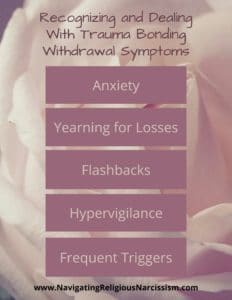Reviewed by Karis A. Williams, MSMHC, LPC, January 13, 2024
Ending a relationship in which you are trauma bonded is not as easy as just walking away. The longer someone has been involved in the push-and-pull of a trauma bond, the harder it is to break away without significant withdrawal symptoms.
So, how do we work through trauma bonding withdrawal symptoms when we break up with our abuser? First, we must recognize those withdrawal symptoms, such as anxiety, yearning for the loss of positive aspects of the relationship, flashbacks, and hypervigilance in current and future relationships. Next, we need to realize that those withdrawal symptoms are incredibly hard to work through, but not impossible. Having a supportive network is critical.
But First…
Before we dive in too deeply, I want to talk a little bit about the fact that many trauma bonding victims have no idea they are being abused. While they likely feel that something is wrong, they can’t put their finger on it. So before victims can work on their breaking of the trauma bonding and healing, they must be able to recognize the signs of trauma bonding (for an in-depth article on the signs of trauma bonding, click here). Victims will need support in helping them to recognize the damage being done so they can start to heal.
*Note: For the best resources on understanding, dealing with, and healing trauma bonds, click here!
Let’s take a deeper look at each of the trauma bonding withdrawal symptoms and some ways to deal with them effectively.
Trauma Bonding Withdrawal Symptoms: Anxiety
After walking on eggshells for a period of time (the longer, the worse effect), trauma bonding victims will feel many things. They will feel a sense of dread that they can’t quite pinpoint the cause of. Or they will feel nervous and restless over things that they can articulate as well as unknown causes. Even worse, they can feel a sense of impending danger or doom. An inability to concentrate or focus makes daily life difficult as well.
Even though anxiety occurs because your mind is having a hard time wrapping itself around something, it very much affects the physical body. According to Healthline.com, anxiety causes the following physical symptoms:
- stomach pain, nausea, or digestive trouble
- headache
- insomnia or other sleep issues (waking up frequently, for example)
- weakness or fatigue
- rapid breathing or shortness of breath
- pounding heart or increased heart rate
- sweating
- trembling or shaking
- muscle tension or pain
Additional symptoms could be nightmares, flashbacks, shudders at sudden memories, and your mind racing regarding previous experiences. In severe cases of trauma bonding, PTSD and C-PTSD are issues to deal with.
If you feel that you are suffering from any of these symptoms, please see and doctor and/or a counselor for professional advice and treatment.
If you feel unsafe or that you could be in any danger, contact the National Domestic Violence Hotline at 1-800-799-SAFE (7233). Or you can visit online at thehotline.org.
Trauma Bonding Withdrawal Symptoms: Yearning for the Loss of Good Times
This trauma bonding withdrawal symptom was a very hard one for me to get through in my own healing. One of the problems with trauma bonding is that even though some victims can identify the abuse that is happening, they rationalize that the good experiences are worth putting up with the bad ones. When the victim doesn’t acknowledge the bad times as abuse, it makes it even harder to see that abuse is never justified, even if the good times are more frequent than the abuse.
Once I realized my narcissist ex-husband was not willing to do anything to heal our marriage and filed for divorce, I instantly felt the grief of losing the person that was supposed to be my companion as we grew old together. But what I was grieving was merely a construct and not reality. Would we have had good times? Of course. He wanted to experience good things, so of course there would be times that we would both enjoy.
The following picture probably speaks the loudest of what I was grieving when my ex and I broke up. While I still think it is a huge thing to lose, what I wasn’t realizing at the time was that the picture did not communicate the reality of my future relationship if I hadn’t gotten divorced. I was grieving a relationship that didn’t actually exist except for in my mind and dreams.

Trauma Bonding Withdrawal Symptoms: Flashbacks
Flashbacks are a trauma bonding withdrawal symptom that often goes along with PTSD or C-PTSD. The victim is often triggered by a sight, smell, sound, taste, or even a unique texture they feel that causes them to be brought back to a specific memory. Other triggers can be an emotional memory, a conversation that reminds the victim of an event, or even a totally random experience that causes a flashback. The brain is still way beyond our understanding in its minute attention to detail and functionality. And yet, I can’t remember what I ate for dinner last night, lol.
Flashbacks can often feel like deja vu. But over time, as you learn to process your memories as past tense, the flashbacks will fade into distant memories. And the distant memories will feel much less triggering. Processing those flashbacks with a counselor or helpful friend or family member you can trust will make great strides toward healing. There are also some great resources. The best book I have found is Trauma Bonding: Understanding and Overcoming the Traumatic Bond in a Narcissistic Relationship.
This book is a best seller and one of the most affordable books on the market. It was so incredibly helpful for me to learn the ins and outs of life in a trauma bond and help in healing. Check it out:
Trauma Bonding Withdrawal Symptoms: Hypervigilance
Even though I have been separated from my ex for 4 years and divorced for nearly a year, I still sometimes deal with hypervigilance in certain circumstances, although thankfully not on a regular basis anymore.
This trauma bonding withdrawal symptom is probably one of the most prominent. It is borne out of the need to de-escalate every situation that occurs for the sake of keeping the abuser even-tempered. If the victim can head it off before things get bad, then it is a good day. Hypervigilance in or even after a trauma bond is another behavior that comes from triggers based on past abuse. The victim is “trained” by the abuser to react in certain ways to his behavior. So not only does the victim get the reward of no “punishment” for allowing the situation to escalate, the abuser also doesn’t have to deal with the victim being “difficult.” And believe it or not, the victim actually considers this as much as a win-win as the abuser.
Learning how to work through hypervigilance takes a significant amount of counsel and practice before the victim is successful with it. It is a combination of setting boundaries, understanding how to respond in healthy ways to your abuser while keeping yourself safe, and knowing when you need to hang it up and leave.
As for the boundaries issue, the book, Boundaries, by Henry Cloud and John Townsend is the best you can read. Regarding responding to your abuser in healthy ways as well as knowing when to call it quits, The Emotionally Destructive Marriage by Leslie Vernick is perfect.
Trauma Bonding Withdrawal Symptoms: Frequent Triggers
The last trauma bonding withdrawal symptom that I would like to talk about is kind of an overarching symptom. It can be the cause of most of the previous withdrawal symptoms I have already mentioned. But it is a symptom in and of itself because it comes from not being able to process years of psychological, emotional, physical, sexual, financial, spiritual, or any other form of abuse. Your body is telling you that you are in danger, but your brain can’t quite figure out what to do about it.
You will realize when you are feeling triggered pretty quickly. Your heart rate will increase, your adrenaline rush will kick in, and you may even start to feel like your “blood is boiling.” When you start to feel this way, you will need to consciously change your thinking. Get control of your feelings, but don’t discount or ignore them. It is okay to feel what you are feeling. But keep it rational in a healthy way (again, don’t dismiss them with rationalizing–think rationally!).
You need to ground your thinking in ways that allow you to see what is really going on and stay level-headed and safe. And then, you will need to respond in a healthy way. It sounds like such a tall order. But once you start working with the process, it becomes easier and easier. And before long, you will look back on these exchanges and actually be proud of yourself for how you handled it!
Need another book recommendation for this one? I have a super-awesome one! It is The Body Keeps the Score by Bessel van der Kolk. At the time I wrote this article, I wasn’t the only one that loved it. It has a 5-star rating with 46,283 reviews! It has helped so many people.
Conclusion
When a victim is in the middle of a trauma bond, escape and healthy living seem like a distant impossibility. But it is critical that they remove themselves for the sake of their safety and emotional health. Understanding trauma bonds is crucial to living a good life. And the best part is that once you learn what trauma bonding is and how to successfully remove yourself, it won’t just apply to the current relationship you are in.
You will be able to navigate every relationship in your life in a more healthy way. This includes personal relationships as well as work, church, civic organizations, school–literally anyone you relate to. Recognizing and avoiding unhealthy relationships before they start will be a lifelong strength that you will appreciate on almost a daily basis.
There is one more thing I would like to mention as you go ahead on your healing journey. Generally speaking, the only way to truly heal a trauma bonded relationship is to go no contact. In the case of sharing children, you will need to go very limited contact. Meet up in public places or somewhere there is a witness involved so if things go south, you have verification if your abuser tries to do something inappropriate.
Keep all communication in writing unless there is a witness with you. Those two things alone will be life-changing in how you deal with an abusive ex. And finally, make sure you have the best lawyer you can find who understands narcissism and trauma bonding issues. As long as your ex knows he is being held accountable in these ways, he will move on to easier targets. And you will be golden.
Do you think you may be involved in a trauma bond relationship? Take this quick test to get more information!
Feel free to comment below, or contact me here if you do not feel safe posting publicly. Blessings to you!

If you liked this article, I think you will also love the following articles:
Types of Trauma Bonding: What You Need to Know
The Seven Stages of Trauma Bonding: An In-depth Look
Signs of Trauma Bonding You Need to Look Out For
What to do When Your Narcissist Threatens You
The Bible Used as a Weapon Against You: You can Overcome!
What Does the Bible say About Abusive Husbands?
The Link Between Spiritual Abuse and Narcissism
What Does the Bible Say About Abusive Husbands?
The Link Between Spiritual Abuse and Narcissism
Can a Narcissist Change for Love?
Why are You Attracting Narcissists?
Why Narcissists Love Going to Church
Does a Narcissist Know They are a Narcissist?
How Religious Narcissists Think?
Can a Narcissist be a Good Person?
Narcissistic Behavior: What to Look Out For
Praying for Your Narcissistic Husband
Are Spiritual Narcissists Overt or Covert?
How to Navigate Religious Narcissistic Parents
What Happens to the Soul of a Narcissist?
How to Heal From a Spiritual Narcissist
Can You Maintain a Relationship With a Spiritual Narcissist?
Can Narcissists Have a Spiritual Awakening?
How Will God Judge a Narcissist?
When the Church Says to Move Back in With Your Narcissist
What Can We Say to a Friend Who’s Divorcing
23 Reasons Why Narcissists are Drawn to the Church
When the Church Doesn’t Recognize Narcissistic Abuse
Will the Church Support Divorcing a Narcissist?
What Does the Bible Say About Narcissism?
Can a Spiritual Narcissist Heal?
Can a Narcissist Be a Christian?
What Does the Spiritual Narcissist Do When You Try to Leave?
- How to Choose the Best Attorney When Divorcing a Narcissist - March 23, 2024
- Why Won’t God Heal my Narcissist? - February 28, 2024
- How Narcissists Use Religion to Control and Manipulate You - December 26, 2023









